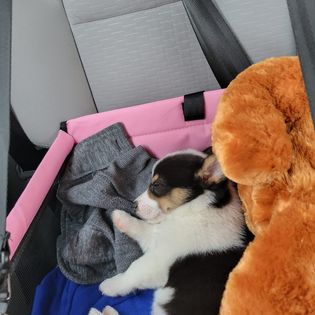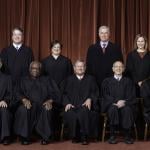Jeanne’s and my 9-month-old corgi, Bovina, has been the center of our lives since we flew to Atlanta and drove her back to Rhode Island when she was just six weeks old last October. Given what a large space she has staked out in our house and our daily routines since she walked into the house, it’s surprising that I have not written much about her on this blog since her arrival. People have asked me what Bovina’s “adjustment period” was when she arrived. My honest answer is that there was no adjustment period. She walked into the house, said “I’m in charge,” and nothing has been the same since.
Given what a large space she has staked out in our house and our daily routines since she walked into the house, it’s surprising that I have not written much about her on this blog since her arrival. People have asked me what Bovina’s “adjustment period” was when she arrived. My honest answer is that there was no adjustment period. She walked into the house, said “I’m in charge,” and nothing has been the same since.
Corgis are extroverted, loud, bossy, loving, playful, stubborn, easily bored, and incredibly smart. Bovina has more personality than most human beings I’ve ever met, including me. We have enjoyed and continue to enjoy watching her personality develop as her likes and preferences are revealed as she encounters new situations.
And then there’s how she relaxes. Bovina prefers to lay on our hardwood floors than to curl up in any of the half-dozen dog beds that she has available. Our dachshund Winnie use to flip on her back to get her belly rubbed, but flat on her back with all body parts, including private ones, on display is Bovina’s preferred way to sleep.

Thinking that this was unique to Bovina, I posted pictures of her sleeping on her back on the two corgi owner and lover Facebook sites that I am part of. As it turns out, this is a general corgi preference–within ten minutes at least two dozen other corgi owners posted pictures of their upside-down sleeping canine. Corgis also like to lay on their stomachs with their back legs stretched out behind them. Go figure.
Before I found out that all corgis like to sleep on their back, several friends told me that when a dog sleeps like that, it is a sign that they are very comfortable in their surroundings. It is a sign, one friend suggested, of “absolute trust.” When a dog sleeps or relaxes like that, it means that they are completely comfortable with being vulnerable because they have no reason not to be.
I like that explanation better than the “this is just how corgis roll” explanation, even though absolute trust might actually be how corgis roll. Jeanne and I have had four dogs before Bovina, all of whom were at least a year old when they showed up at our house. None of them slepton their back. Two of them were rescues with all sorts of inexplicable and odd personality quirks that we always attributed to some trauma or series of traumas that happened before they met us.
Bovina has had no such trauma in her short life. She spent her first six weeks at Red Elephant Farms in Georgia which breeds beautiful (and expensive) corgis. The last eight months of her life have been with two people who love her so much that I’m surprised she can stand it. No one has ever hit Bovina, yelled at her (not much, anyways), put her in a cage, locked her up somewhere she didn’t want to be, forgotten to feed her, or failed to attend to every one of her perceived needs—you get the point. Bovina has no reason not to absolutely trust that all things will work together for her good. Because they do.
For human beings, at least those who have grown beyond a certain age, trust is a heavy lift. Each time life kicks us around, we become more suspicious, more fearful, and build thicker and thicker walls as protection strategies. Everyone knows that exposing oneself to life’s uncertainties and possible harm as Bovina exposes herself to the world when she sleeps leads to guaranteed damage and disaster. It takes a long time to build trust in relationships with others and takes very little to undermine that trust. Anyone who trusts that their boss or the government has their best interests at heart is either naïve or a fool.
What is the role of trust in the life of a person of faith? Last Sunday I pinch-hit on the organ at church; one of the hymns was “If Thou But Trust In God To Guide Thee.” It’s best not to listen to the words. The first verse says
If thou but trust in God to guide thee and hope in Him through all thy ways,
He’ll give thee strength, whate’er betide thee, and bear thee through the evil days.
Who trusts in God’s unchanging love builds on the Rock that naught can move.
Oh really? For those who have ever expected God to show up in an important situation and have instead received the sound of crickets chirping, this sounds as naïve as “God never gives you any more than you can handle.” I’m reminded of other hymns from my Baptist youth that are not in the Episcopal hymnal, such as “’Tis So Sweet to Trust in Jesus” and “Trust and Obey,” whose chorus says, “Trust and obey, for there’s no other way to be happy in Jesus but to trust and obey.” For those whose “faith walk” occasionally feels like a death march, such platitudes sound like nursery rhymes.
I’ve read several of Peter Enns’ books this summer; my favorite so far is The Sin of Certainty, in which he has several points to make about belief and faith that have made me rethink what trust in God actually might look like in real time. Enns comes from a similar religious background as mine in which one is taught that the Christian faith is about right belief, about certainty concerning what one believes, and about aggressive resistance to anyone who resists or doubts that certainty. The problem is that, eventually, it becomes clear that whatever faith requires or is about, it can’t be certainty.
Life’s challenges mock and then destroy a faith that rests on correct thinking and the preoccupation with defending it. And that’s a good thing . . . Life is a pounding surf that wears away our rock-solid certainty. The surf always wins.
Enns suggests that every time one uses the word “belief” in the context of faith and the desire for certainty, one should replace “belief” with “trust.” Trust is about relationship, not content. Trust is about commitment, not evidence. It’s about choice, not argument or even logic. And a trust-centered faith is far more resilient than a faith that demands certainty in a reality that provides very little that is certain.
Trust is not marked by unflappable dogmatic certainty, but by embracing as a normal part of faith the steady line of mysteries and uncertainties that parade before our lives and seeing them as opportunities to trust more deeply. . . Rather than being quick to settle on final answers to puzzling questions, a trust-centered faith will find time to formulate wise questions that respect the mystery of God and call upon God for the courage to sit in those questions for as long as necessary before seeking a way forward.
The Jewish scriptures are full of expressions of trust in the middle of circumstances where the divine not only seems absent but often appears to be actively antagonistic. One of the most profound statements in the midst of inexplicable disaster and suffering is when Job insists that “Though He slay me, yet I will trust Him.” That’s a commitment that goes far beyond evidence as well as all of the things that Job had been taught to believe concerning God. Enns once again:
Trust acknowledges faith as transrational, submission to the mystery of the Spirit. For Christians, this is summed up in the mystery of a Creator who participates in the human drama . . . Trusting this incarnating Creator gives us freedom to know or not know, to accept certainty when it comes or the absence of certainty, clarity or doubt, rest or restlessness.
 I’ve known for a long time that whatever faith is, it can’t be rooted in certainty or in the sorts of evidence and arguments we expect to be available when seeking certainty. But I’m going to have to work on this trust thing. Bovina-style trust is beautiful to see, but not suitable for negotiating the ups-and-downs of human experience. Instead, I find the music of “If Thou But Trust in God to Guide Thee” promising here. The words are not helpful (to me, at least), but the music is in a minor key (unusual for hymnody) with complex harmony. Perhaps that’s how trust works—harmony in the midst of, rather than in spite of, the minor keys of life.
I’ve known for a long time that whatever faith is, it can’t be rooted in certainty or in the sorts of evidence and arguments we expect to be available when seeking certainty. But I’m going to have to work on this trust thing. Bovina-style trust is beautiful to see, but not suitable for negotiating the ups-and-downs of human experience. Instead, I find the music of “If Thou But Trust in God to Guide Thee” promising here. The words are not helpful (to me, at least), but the music is in a minor key (unusual for hymnody) with complex harmony. Perhaps that’s how trust works—harmony in the midst of, rather than in spite of, the minor keys of life.













